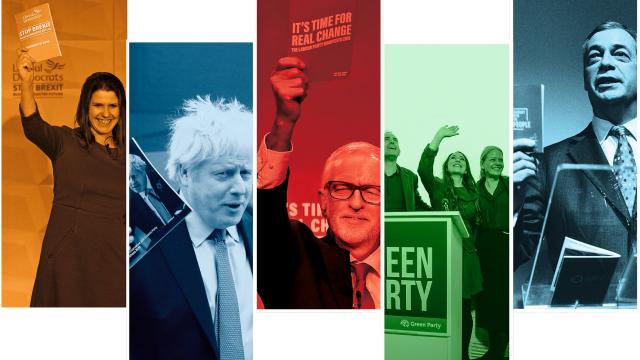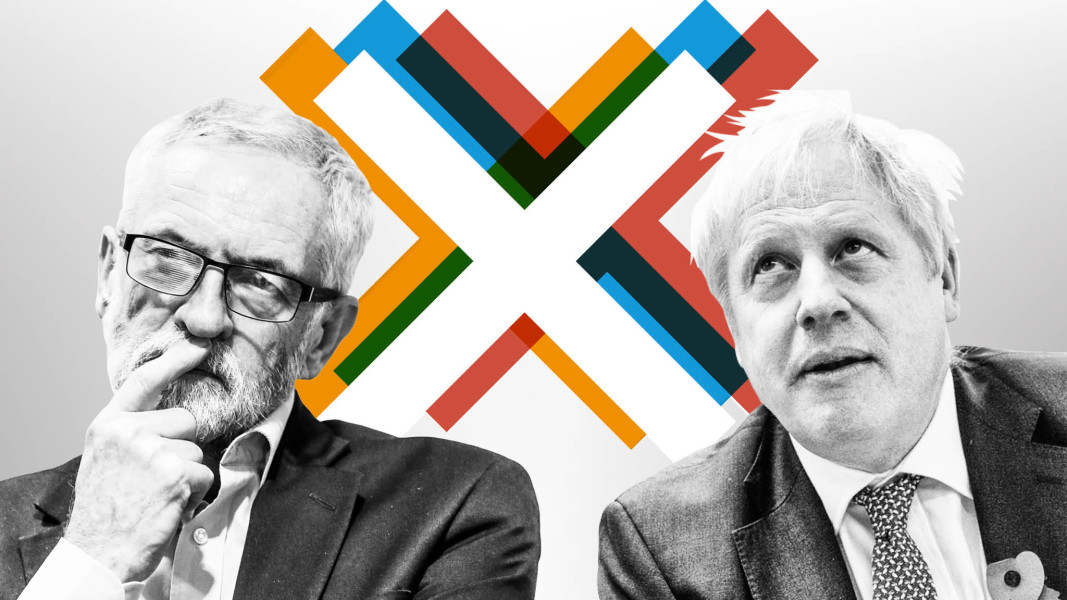
This is the fourth installment in a series about extending the Green New Deal to confront multiple global crises. Read Part I, Part II and Part III.
Britain's fast approaching General Election on Dec. 12 represents a life or death decision for the country's two major parties – and, of significant more consequence, for the planet. Voters can back Labour's Green New Deal and act on the climate emergency, or they can elect the Conservative Party pushing an ever more destructive form of capitalism.
Discussing extending the Green New Deal to deal with the world's multiple crises is academic unless political parties pushing this solution can win elections. Only then can social movements and society demand that politicians make their words into actions. Only then can we continue building the counter power necessary to challenge the 1% that are doing everything to resist the required political pathway to extend our planet's inhabability.
Time for real change
Last week, on Nov. 21, Labour launched its manifesto, "It's time for real change." Ecologically, it offers:
-
9,000 more wind turbines, 150 million added square metres of solar panels and a major Welsh tidal power project.
-
£250 billion for green energy, transport and environment restoration, including reforestation.
-
1 million green jobs and 320,00 green apprenticeships.
-
Nationalisation of rail, water and energy.
-
100,000 low-carbon social houses and the promise to make 27 million homes energy efficient.
-
A one-off tax on big oil.
On public services the manifesto includes rescuing the National Health Service and creating a National Education Service to enable universal access to free education. The party offers a £10 ($12.80) minimum wage, ends zero-hour contracts and restores trade union rights with a Nordic-style collective bargaining system.
Labour call its economics a Green Industrial Revolution, sharing much with US Green New Deal. In essence, both are about making the economy work for people and planet. One notable difference is the American GND wants to end private health insurance, whereas UK Labour merely plans to stop these same firms from taking over.
Another Labour highlight is what it calls "A New Internationalism". Headline proposals are recognising and seeking remedy for UK's historic injustices committed against the Global South, from slavery to modern tax evasion. The party promises to repay UK climate debts owed to southern countries and support small-scale farmers against agro-business.
Labour rejects what it calls the “‘bomb first, talk later’ approach to security.” As a whole document, the manifesto interprets the social-ecological justice of the GND and makes steps to internationalise it.
Even before the manifesto launched, Conservatives were arguing that Britain cannot pay for all of this. But Labour has a response: in a nutshell, the answer is to shift the burden of taxes onto the billionaires. The underpinning economic theory is that through investment the economy grows, and by sharing wealth, society succeeds. Making billionaires pay for the disasters they profited from is another pillar of the party document.
If the world economic system does not change, the world will likely warm between three and four degrees by 2100. The official advisors to the Committee on Climate Change reported to the UK Parliament in July that the impacts of this climate shift on Britain would be “catastrophic.” in July 2019
With the one degree change we have seen already, swathes of the earth have been flooded or caught fire, with vast numbers suffering famine and other devastations. Britain's Dec. 12 election is all the more important as the incumbent government is likely to make ecological and social justice crises far worse.
The Conservative (neo) Liberal threat
Since the Conservative-Liberal Democrat government took power in 2010, followed by Conservatives in 2015, climate action has declined. Wind turbine projects have been blocked. Solar subsidies ended. Plans for zero-carbon housing were scrapped. Meanwhile, the Conservatives and Liberal Democrats pushed for climate-catastrophic fracking and supported big oil with a £12 billion annual subsidy.
Even supposed international aid money has tended to sponsor planetary destruction, like the funds that have gone to increase fracking in Argentina.
If you want a clear lens on to a politician, look at who funds him. Billionaires are the Conservatives' main backers. Money is rarely rejected, regardless of where it comes from. Boris Johnson personally received money from leading UK climate deniers in 2019.
Over the decade, Conservative bankrollers include LIBOR-rigging bankers, oil companies, mulitnational mining bosses and arms manufactures like JCB among other clients, all of whom profit from planetary destruction.
Liberal Democrats could again back a Conservative-led government, and their backers are nearly as bad. Party leader Jo Swinson has accepted money from fracking companies and a director of a fund that invests in Russian gas.
By contrast, Labour has relied on many small donations and large trade unions contributions.
The trend of billionaires buying Conservatives and Lib-Dems, of course, is nothing new. But Brexit adds another dimension. The big money behind Brexit is a web of banking and Big Oil interests. This financing is hubbed around one Westminster address, where Vote Leave worked under the same roof as Britain's top climate deniers and biggest free trade advocates.
Boris Johnson co-led Vote Leave. Since he assumed leadership of Britain, a swathe of climate denialists have risen in government. This is dangerous. Brexit offers a means to escape EU climate legislation as well as to tear up other regulations and sell off the NHS.
The stark choice this election offers might also set the political tone for the 2020s to come. After its era of empire, Britain still retains great international power. The sun still does not set on the British tax haven empire, which funds vast oil, mining, arms and the other carbon criminals.
Geopolitically, as the US-junior partner, the UK holds great sway. So if it accelerates green economics or goes even more dirty matters far beyond its shores.
Specifically, in 2016, Brexit helped open the door for Donald Trump's presidential win. A Conservative win next month could repeat these results in the US next autumn. On the other hand, if Labour wins it pushes the door toward a US Green New Deal. No wonder Trump, in an unprecedented and un-presidential manner, said about the Labour leader: "[Jeremy] Corbyn would be so bad for your country, he'd be so bad, he'd take you in such a bad way."
Fight of the next generation
Just as Conservatives' political policies align with Trump, their political style mimics him as well. PM Johnson is widely criticised for his rascist and sexist outbursts. He is the peak of a growing wave that has made the country a hostile environment, particularly for migrants, but also other minority communities. Johnson, like Trump, appeals to a base and finds support with populist slogans like "Get Brexit Done" – which might as well say, "Make Britain Great Again."
Labour and other parties that might form a green coalition – the Scottish SNP, Greens, Plaid Cymru and Northern Irish independents – must confront this populism head on. Polling data shows that tackling climate change and other aspects of Labour's manifesto are popular. Yet polls also show the Conservatives leading.
With several weeks until the vote, Labour is engaging in a massive mobilisation to win. In the 2017 election, Labour nearly did it. The same tactics are now refined. Mass voter registration drives mean even more young and often non-voters can vote. One focus has been to push more face-to-face conversations with constituents to keep the momentum rising.
This election, perhaps more than any that came before it, shows you cannot simply push forward common sense politics in order to win. You also need to overcome the populist lies and deception the 1% will throw your way. This election, to be successful for people and the planet, needs to be not only for the many but by the many.
















